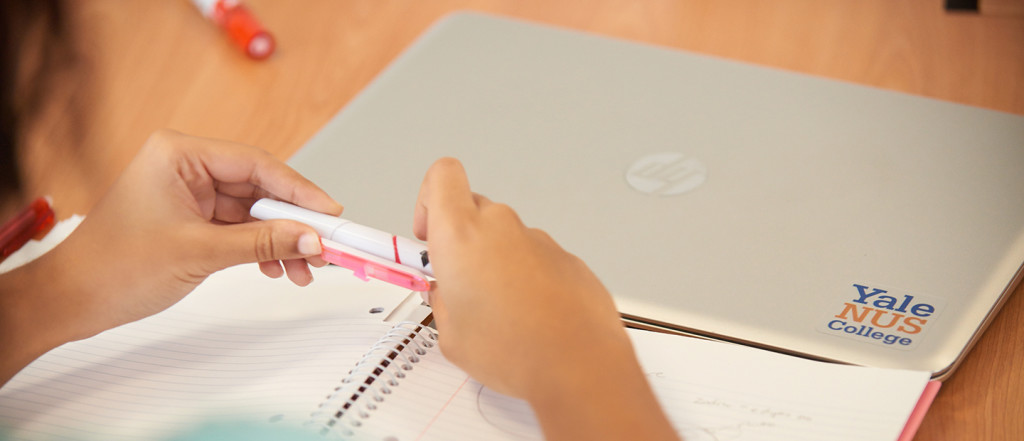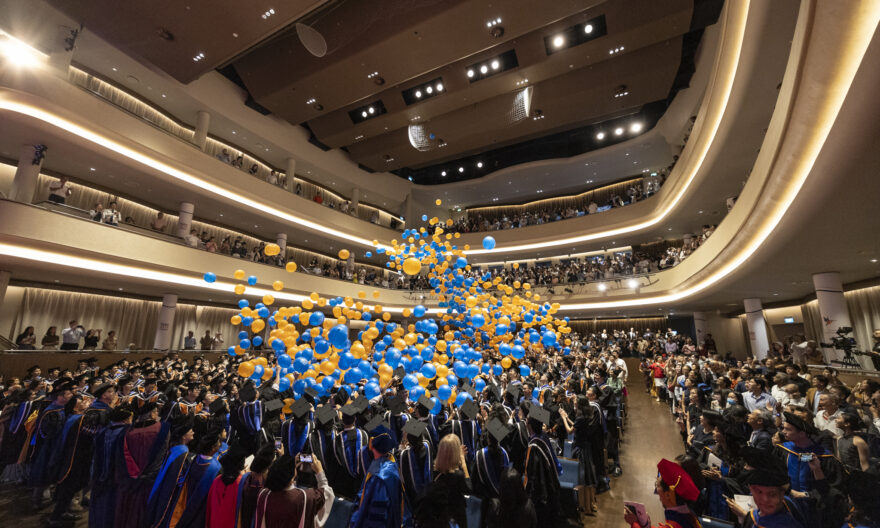Student organisation, So/psy/ety, promotes interdisciplinary and experiential exploration of psychology and the mind

This semester, several Yale-NUS students will be visiting Pathlight School weekly as study buddies to students there. The first autism-focused school in Singapore, Pathlight School offers Singapore’s mainstream academic curriculum and life readiness skills for children with mild to moderate severity of autism.
“We primarily focus on improving the students’ written expression for their Humanities subjects by guiding them through reading and writing practices, and providing them feedback on their writing,” explained Joceline Yong (Class of 2018) who initiated this programme as part of So/psy/ety, a Yale-NUS student organisation.
“Our role is mainly to supplement what they learn in class and offer support by reinforcing their learning and giving them more opportunities to practise their writing.”
Joceline was first interested in the idea of engaging with psychology beyond the classroom and putting the content she learnt in psychology classes into practice. After a conversation with Assistant Professor of Social Sciences (Psychology) Jean Liu about intervention programmes for children with autism in other countries, where university students would visit them in their homes to help with their social skills and speaking abilities, she decided to set up a similar programme at Yale-NUS College.
“One of the main aims of the programme is to allow Yale-NUS students to experience interacting with students with autism – to put a humanising touch to Autism Spectrum Disorder, which is one of the many psychological conditions we learn about in class, and help volunteers better understand that people with autism or any other condition are not all that different after all,” elaborated Joceline.
Before they started volunteering, the Yale-NUS students were required to attend training by a teacher from Pathlight on the fundamentals of autism and specialised training on working with children with autism.
This is one of the many activities that members of So/psy/ety have organised since the group started. Founded by several students majoring in psychology from the Class of 2017 including Daryl Tan and Priscilla Chia, the group aims to provide a platform for students interested in psychology to discover more about the role our minds play in our everyday lives.
“Yale-NUS’s interdisciplinary approach offers a way to see how psychology permeates through to different disciplines, from discussing the philosophy of the mind, criminal psychology in law or even how the brain responds to art and we hope the activities we organised could dispel many of the myths surrounding psychology,” shared Priscilla, a co-founder of the group.
“For instance, it’s much more than people lying on couches and talking. We hope that through So/psy/ety, we can support the faculty, fellow students and even the community in the pursuit and application of the discipline of psychology.”
On why she first got involved in setting up such a group, Priscilla explained that it was the unique role that the group could play in a liberal arts setting.
She said: “Unlike psychology societies in other local universities where they cater specifically to psychology majors, we really want to pursue the study of psychology through an interdisciplinary approach, to show how it is relevant to each of us regardless of what we study, and Yale-NUS is honestly the perfect platform for such a pursuit.”
Some events that the group has organised include hosting speakers in the field of psychology, including Dr Daniel Fung, Director of the Medical Board at the Institute of Mental Health, and Dr Judith Harackiewicz, a social psychologist renowned for her work on achievement motivation.
“This club has enabled me to look beyond the topics we learn in class, and to see its applications in real life,” shared Daryl, another co-founder of the group. “For example, Dr Fung talked about whether child psychiatry could die out by equipping people in the community to help children at risk of mental disorders, preventing them before they even occur.”
“This got me interested in the idea of community psychology, and how just the sense of belonging alone can improve well-being and participation,” he added.
“Looking ahead, we are hoping to have some informal sessions akin to Philosophy Cafes and to continue engaging the wider psychology community and network, as well as organise some events that involve using psychological concepts to improve one’s life, basically psychological life-hacks.”
For Joceline, her experience volunteering with the students from Pathlight has helped her better understand that people with autism or any other condition are not all that different after all.
“Having volunteered with the programme for one semester thus far, my biggest takeaway has been realising that my students are wonderful people with their own quirks, aspirations and unique qualities.”
“After their exams, they wrote a letter to tell me that their grades had improved, that they had all passed their exams, and were looking forward to seeing me again after the holidays,” she reminisced. “Their handwritten letter was one of the sweetest things I’d ever received, and reaffirmed my commitment to the programme.”





